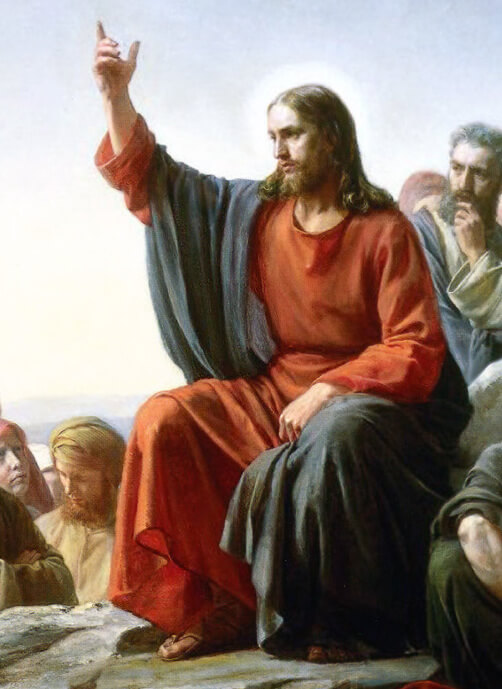Good News
Do You Reflect The Good News?

First Sunday Of Lent
Fr. Mark Gatto
Preached: February 18, 2024
When people experience your Catholic faith, in your words, in your actions, in your life, do they experience it as good news? When people experience our Catholic Church, including our local parish, do they experience good news? In the Gospel of Mark, it says that Jesus came proclaiming the good news of God.
What was this good news? In Jesus, God was speaking a word of love to humanity. God was saying, I love you, I forgive you. God was saying that the will of God is for our salvation, not our condemnation. In Jesus, many people for the first time were able to believe that they could be accepted by God, embraced by God.
Especially the poor, the tax collectors, women, the lepers, and so many others who had been convinced that they were not worthy, that they were not welcome with God. Now, in Jesus they were hearing the incredible good news that, yes, God did want to receive them and they too could be welcomed in the Kingdom of God.
Imagine always being told that you were impure, not worthy, not loved by God. Then you discover for the first time that it is possible for you to be received and embraced and loved by God.
One key word to understand the good news is the word Covenant. In our first reading today, from the Book of Genesis, we see the Covenant established after the Great Flood between God and Noah and all living creatures. Marked by the sign of a rainbow in the sky. Later on we will see other Covenants formed by God with Abraham and with Moses on Mount Sinai. Finally, in Jesus, God comes to reveal the eternal Covenant binding God to us for eternity in unconditional love and mercy.
We express this Covenant every time we celebrate the Eucharist. We hear the words of Jesus at the Last Supper, “this is the chalice of my blood, the blood of the new and eternal covenant.” We use this word Covenant to describe what Christian Marriage is meant to be. The best definition of Covenant I have heard is simple, “Covenant is the promise to remain.” This is the good news, God’s promise to remain with us in life and in death with an unconditional love for eternity.
First preaching of Jesus is “repent and believe in the good news.” People struggle to believe in the good news of the eternal love of God. Struggle to believe in the covenant of God promising to remain and who desires our salvation and not condemnation. Many of us find it difficult to believe this good news. We feel we are not worthy, that we not good enough. But, Jesus proclaimed good news, revealed the great covenant, the promise to remain by a God who longs for us and loves us.
Our challenge as Catholics, as disciples of Jesus, is to live and speak and be with others in a way that will help them to believe in the good news of God’s Covenant in Jesus. That God embraces them. Do people experience this good news in their encounter with the Church, in their encounter with you?
I saw this quote by a minister recently. He said, “Our Christianity should sound like this: ‘the world is full of neighbours to be understood and loved,’ not ‘the world is full of enemies to be feared and conquered.’” How we live our faith, the way we speak about our faith, the way we treat others, does it reflect good news?
Reflect good news in your Catholic faith. Speak to people, speak about people, be with people, in a way that reflects this undying love of God who promises to remain with us.
Believe the good news brought by Jesus, that God is in love with you. Then help others to believe that God is in love with them.
Will You Hold Me?

Christmas 2021
Fr. Mark Gatto
Preached: December 25, 2021
In World War II there was a soldier on duty on Christmas morning. It had been his custom to go to church every Christmas morning with his family, but now, in service on the outlying districts of London, this was impossible. So, with some of his fellow soldier friends, as dawn was breaking, he walked down the road that led to the city.
Soon they came upon an old, grey, stone building over whose main door were carved the words, “Queen Ann’s Orphanage.” They decided to knock and see what kind of celebration was taking place inside. In response to their knock, a matron came and explained that the children were orphans whose parents had been killed in one of the many bombings that took place in London.
The soldiers went inside just as the children were tumbling out of bed. There was no Christmas tree in the corner. There were no presents. The soldiers moved around the room wishing the children Merry Christmas and giving them whatever gifts they had in their pockets: a stick of chewing gum, a Life Saver, a nickel, a dime, a pencil, a pocket knife, a good luck charm.
The soldier who had gotten his friends together noticed a little fellow alone in the corner, that little fellow looked an awful lot like his nephew back home. So he approached him and said, “And you, little guy, what do you want for Christmas?” The boy replied, “Will you hold me?” The soldier, with tears brimming in his eyes, picked up the little boy and held him very close in his arms.
The mystery of Christmas is the good news of God wanting to hug humanity, God wanting to hold each of us in some way that we can see, feel, hear. In Jesus, God is holding us.
During this Christmas season, each one of us needs to take time to be in the presence of Jesus, to allow God to hug us, to embrace us in tender care. Then you need to look around, who needs to experience the love of God through you? In your family, among your friends, where you work or study, among your neighbours, in our parish. Are there people who are like that little boy who needs to be held by you, who need a hug from you, who needs a kind word from you?
You may be the one person who is able to hold someone on behalf of God. You may be the one person through whom God is able to be present to someone.
That little boy did not want any gifts on that Christmas morning, he only wanted one person to hold him. Who is the person in your life who just needs to know they are loved through you?
Good News!

1st Sunday Of Lent – Year B
Fr. Mark Gatto
Date Preached: February 21, 2021
What did Jesus say in his very first homily? We do not know for sure, but at the beginning of Mark’s Gospel we see the first words that he has Jesus preaching. “Repent.” This means to change, to return to the truth, return to God, to turn back to the way of God, to see in a new way. Certainly, Lent is a time of repentance, we are striving to return to the heart of God, turn back to the way that is our true self as a child of God.
But, then Jesus goes on to say, “Believe.” What is it that we are supposed to believe? Jesus says, “Repent and believe in the good news.” Believe in the good news. What God reveals in Jesus is good news, what we as Christians are to preach is good news.
God does not desire to destroy humanity, does not have a plan to wipe out humanity. God is not focused on punishment. In our first reading we see the story of the Great Flood and how Noah was saved. Here we see the story of the first covenant established by God with all humanity.
Symbolically seen in the bow in the sky. It is God’s covenant with the whole earth that promises not to destroy everything as in the Flood.
God is a God of salvation, of reconciliation, of healing, of new life. In Jesus, this is made even clearer. God makes a new covenant in Jesus. An eternal covenant in which God promises to remain with us forever, never to abandon us, to offer us forgiveness and salvation.
The heart of the Christian message, the centre of the Gospel is Good News. During this pandemic there have been so many conspiracy theories being promoted on-line and elsewhere. Many so called prophecies by various figures, including Christian figures. Most of them are centred on some sort of great apocalyptic moment, some dramatic display of power that often seems to be about punishing people and saving a select few.
When you listen to preachers or other figures, ask yourself, is this good news? When you are reading on-line sites with predictions or other visions about our present situation. Ask yourself, is this a message that gives me hope, that encourages me, that helps me to turn around and face the path of God? If some conspiracy theory or some prediction or some so-called prophecy seems more like bad news than good news, then you should question it right away.
This also should influence how we see the sacraments. Many are concerned because they could not get to church for Mass during this past year, others are too nervous to come out due to Covid. Some feel worried about this or feel guilty about this. But, the sacraments are left by Jesus for the church, not as some proof of our holiness, or some test to be passed, or something we do to earn our salvation. The sacraments are meant to be instruments that aid us on our way to salvation.
For instance, if a mother with a new born child cannot come to church because she needs to stay home to care for her child, that is truly the will of God. Also, if you miss Mass during a pandemic to care for your life or out of concern for others, then this is in the spirit of God who desires our life and salvation, not our death.
The first and foundational preaching of Jesus was “repent and believe in the good news.” Lent is a time to repent, to turn around, to see in a new way. What we are called to believe is good news. It is a message of a God whose will is for our salvation, our healing, our reconciliation, our peace. It is not a message of condemnation, rejection or punishment.
Be suspicious of any person whose teaching or preaching seems to be more bad news than good news. Preach good news by your life, by your words, and by the way you treat each person.
The Good News

Third Sunday in Ordinary Time – Word of God Sunday
Fr. Paul Patrick, O.M.I.
Posted: January 24, 2020
1.0 Euangelion
“After John had been arrested, Jesus went into Galilee proclaiming the Good News from God. ‘The time has come’ he said ‘and the kingdom of God is close at hand. Repent, and believe the Good News.” (Mark 1:14-15)
In our reading for this Sunday from the Gospel according to St. Mark, the author uses an interesting term multiple times: Good News. What does this term mean and why is it used?
A few weeks ago we celebrated Christmas and most likely either heard or read the well known proclamation from the angels to the shepherds regarding the birth of Christ. “And the angel said to them, Fear not: for, behold, I bring you good tidings of great joy, which shall be to all people.” (Luke 2:10) In the original Greek text, the word used in both the Gospel according to Mark and the Christmas story from Luke is the same Greek word euangelion.
The word Gospel comes from the early Anglo Saxon words good spiel or literally good news or glad tidings which in turn is the Anglicized translation of the Greek euangelion. This word originally meant ‘the reward given to the one who brought good news’ as in a messenger in ancient times who brought good news to people who were waiting to hear the news of some major event in their country, such as a battle. Therein is contained a sense of joy, of relief, of happiness, to hear the wonderful news – the euangelion that the battle was over and peace would return. This phrase was later adopted by Greek speaking Christians to describe the greatest news they had ever and would ever receive, the good news that Jesus loved them and came to change their lives forever.
2.0 – Why Good Tidings of Great Joy?
Oftentimes as Christians we use ‘religious words’ which have to a certain extent lost the original weight of their meaning in the context of the 21st century. I believe that the words Gospel and Good News or Glad Tidings could sometimes fall into that category. It is important to reflect from time to time on their original meaning because it sheds a different light on the Gospels and allows me to read and meditate on the Gospel with perhaps a different perspective and viewpoint than before. The Gospels are a joyfull story of salvation which is a testament of God’s enduring love to His people.
During the course of my studies I had the privilege to study with a brilliant Scripture professor who told our class repeatedly: “The only way to truly understand the Gospels is with joy in your heart”.
3.0 – Word of God Sunday
On September 30 2019 Pope Francis declared the Third Sunday of Ordinary Time “Word of God Sunday” In a document entitled “Aperuit illis” – “He opened their minds” – the Pope highlighted the importance the Word of God should have in the life of every modern Christian.
One of the ways God reveals Himself to us – or in other words – one of the many ways we can learn more about God and His plan for my life is by reading and meditating on God’s word.
Something you might want to consider during the lockdown is to read a little scripture every day. It can be as simple as praying a short prayer to the Holy Spirit for enlightenment and then reading the Gospel for the day and reflecting how the Lord is speaking to you through the Gospel reading.
If you find it hard to get started, there is a very good program running at the moment on both Apple and Google podcasts entitled Bible in a Year by Fr. Mike Schmitz. It is presented in an approachable and easy to understand format. It is also a wonderful way to introduce a little daily Scripture into your life in a guided format which removes the mystery and anxiety which might prevent you from reading God’s Word on your own.
Have a wonderful Sunday and let us allow God to continue to speak to us through His Word 😊
The Mystery And Gift Of Christmas

Christmas 2019
Fr. Mark Gatto
Preached: December 25, 2019
What is God doing? What is God trying to say to us?
We speak of Jesus as the Word of God. In Jesus, God wants to speak to humanity. God wanted to reveal something to us.
What do you think God wanted to say to us in Jesus? What do you think God was trying to say to us?
This is an incredible mystery and gift. That the Creator of the Universe, the infinite Spirit, who is God, wants to speak to us human beings. Jesus is God’s Word spoken to us.
Some things we know about that Word. First, it was Good News. In this time of bad news and fake news, what a gift to have God speak to us Good News. God spoke this word not in a display of overwhelming power, but in weakness, poverty, simplicity. A helpless baby.
God was revealing the dignity of each human being. Including the poor, the weak, the outsiders, the sinners, those rejected by so-called good society.
Secondly, this Word is a Word of Mercy. God did not come to condemn us but to save us and set us free. So many of us struggle with guilt. We feel we are not worthy for God. But, in Jesus, God says something so different.
Recently I had someone come to speak to me in the church. He had been away from church for a while and felt that he had not lived a good religious life. He said to me that he was worried about coming to the church because lightning might strike him.
But, the mystery of Christmas is God coming among us, to the outsiders, the so called sinners. In fact, the powerful, the Pharisees, the Priests, the so called religious elites of the time did not recognize or embrace this Jesus. It was the poor and the ignored Shepherds who received this Word.
If you consider yourself to be an outsider, not normal, different, a sinner, then that is good, for God in Jesus is speaking directly to you. My hope at this birth of Jesus is not based on my being a priest, rather it is based precisely on my being a sinner, a human being who struggles. For the Word of God, the Word spoken to us in Jesus is precisely for us who are sinners, the outsiders.
In Jesus, our God was building a bridge to come over to visit us and speak to us. In Jesus, our God speaks a word to our hearts.
This Word of God is Good News. It is a Word of mercy. In the coming of Jesus, God builds a bridge to reach all of us. Including those considered outsiders, unimportant, different. This Word is spoken to each one of you.
Is The Bible Good News Or Bad News? – Fr. Mark

3rd Sunday In Ordinary Time – Year C
Fr. Mark Gatto
Preached: January 27, 2019
The Bible can be used for good and for bad. Certainly, in history when used by people in the wrong way, it has been destructive. It has been used to justify the burning of heretics, the Crusades, slavery, apartheid, homophobia, oppression of native peoples and so on. All justified by the selective use of Scripture quotes.
The problem is not with the Bible, but with those of us who read the Bible and use it in the wrong way. That is why it is not enough just to have a Bible or to memorize passages in the Bible. We need to learn to read the Bible in a way that is thoughtful, intelligent, prayerful. We need to read the Bible so that it changes us and not us changing the Bible.
So, how did Jesus read the Scriptures? Jesus would have read what we refer to as the Old Testament, the Hebrew Scriptures. He would have been immersed in the Scriptures and known them well.
In the Gospel of Luke that we just heard, we see Jesus come into the synagogue and he gets up to read the Scriptures and he is given the scroll from the Prophet Isaiah. He selects a passage to read. “The Spirit of the Lord is upon me, because he has anointed me to bring good news to the poor. He has sent me to proclaim release to the captives and recovery of sight to the blind, to let the oppressed go free, to proclaim the year of the Lord’s favour.”
Jesus selects a passage that speaks of good news, for the poor, the captives, the blind, the oppressed. For Jesus, the Scriptures were primarily a source of Good News, calling him to bring healing, mercy, freedom to all in need.
Then after reading the passage from Isaiah, Jesus says, “This passage is fulfilled in your hearing today.” For Jesus, the Bible was not just about what God had done in the past. The Scriptures are meant to change us, to inspire me to live in a new way today.
So, how do we use the Scriptures? We need to read the Bible in such a way that it changes me and how I live. When we use the Bible, do we use it to bring life or to condemn, to bring mercy or to judge? Do we use it for people or against people? In our reading and use of the Bible, is it Good News or does it become Bad News?
When our reading of the Bible leads us to hate, to prejudice, to condemn, or to reject science, when our reading of the Bible seems to be Bad News rather than Good News, then we need to examine our reading of the Bible.
It is not the Bible that is the problem, but we who read and misuse it. Always be wary when politicians use the Bible, for often we see them using the Bible for their own purposes, often in a way that is Bad News for certain people.
Fundamentalism is a danger with the Bible because it wants black and white, simple certainty, and so fails to see the complexity and need to use our intelligence. We need to read the Bible as a spiritual writing that requires reflection and study.
Our response we sung today said, “Your words, Lord, are spirit and life.” Enter into the Scriptures, read the Bible as a spiritual work that is to bring spirit and life. Whenever you hear the Bible being used in a way that seems to be Bad News, be very careful about how it is being used.
The Bible can be used for good or for bad. We need to follow the path of Jesus who read the Scriptures in a way that was Good News. Read and pray with the Bible in such a way that we are open to the Spirit changing us through these words.
Grow Up! – Fr. Mark

Feast Of The Ascension 2018
Fr. Mark Gatto
Preached: May 13, 2018
Grow up. Has anyone ever told you that before? Be Mature. Stop waiting for someone else to do something. Grow up. Perhaps a blunt way to explain the meaning of the Feast of the Ascension.
The Ascension is not so much about Jesus going away But about the disciples of Jesus, the early Church, growing up, becoming mature, taking responsibility for the mission of Jesus. They were no longer sitting around waiting for God to do something. It was now up to them. God was going to do something, but through them.
Jesus commissions them to go out and proclaim the Gospel. Gospel means Good News. Good news, not bad news. Sometimes we Christians sound like people of bad news, always complaining about people, about the world, how bad it is. But, we are to proclaim Good News. We do this by how we live and by how we speak.
Proclaim the Gospel, the Good News. Does the way we speak to one another proclaim Good news? Look at the way you speak to your spouse, the way you speak to your children, the way you speak to friends, the way you speak to your co-workers.
Is it Good News, does it bring hope, encouragement. Does it lead to communion or does it tear down, discourage, criticize all the time? Does our language and way of speaking to others build up or tear down? Is it good news or bad news?
Pope Francis in his Message for World Communication Day this year, included a prayer based on the Prayer of St. Francis. It is called Pope Francis’ Prayer for Countering “Fake News” It is about how we speak, how we communicate to others. In our relationships and also relevant to social media today.
You can find this prayer on line. A good prayer for most of us to use even as a reflection on how I am communicating and speaking to others in my life. (find it online)
So, you will all be sent out from here today, Go and announce the Gospel of the Lord.
On this feast of the Ascension, the blunt message we need to hear is:
Grow Up, become mature Christians. Stop sitting around waiting for God to do something. God wants to work through you. Take responsibility for the mission of the church. Do not wait for the Pope, or the priest or some other person to do this. Do not wait for God to do something.
Go and proclaim Good news. And in particular bring Good news by the way you speak to others, at home, at school, at work, on social media. By your words bring communion, build up and not tear down, bring goodness.
Change – Fr. Mark

Third Sunday In Ordinary Time – Year B
Fr. Mark Gatto
Preached: Jan 21, 2018
Story of an elderly married couple. They had been married for 40 years. Every evening during their marriage they would sit and watch tv. Each of them sat in exactly the same two seats. Then one evening the husband turned to his wife and said, let’s change tonight, let’s do something really different. The wife was really excited imagining a night out on the town. Then the husband said, let’s change our seats. Sometimes I think a radical change in our church would be just to ask each of you to change your seat!
Change, something we do not like very much. We get very comfortable and want to keep everything the same. We were always this way so we do not want to bother trying to change how we are.
But Jesus, the very first message he preaches in Mark’s Gospel, Repent. Change. He is calling us to change. To turn around. To see things in a new way. The need to repent, to change, is necessary to embrace the Kingdom of God. Someone once said that a Saint is someone who has changed often. We as individual followers of Jesus and we as the Church need to be open and ready to repent, to change.
The prophet Jonah in our First Reading is sent by God to the great city of Nineveh, one of the great cities of the world at that time. He is to call them to repent, to change their way of life. The surprising thing is that they actually listen. The people of Nineveh repent, they see that their way of life was wrong and that they need to change.
The problem for us is that we do not like to change, we like to keep things the same, we get comfortable and it is easier to not change anything. Sometimes we feel that it is not possible for me to change. We get stuck or trapped in our old ways of living, old ways of behaving. That is the way I have always been, I cannot change.
Jesus says Repent and believe the Good News. Repentance and believing the Good News go together. The Good News is the salvation offered freely by God. The forgiveness of sins through the unconditional love, the gracious mercy of God. You do not need to remain stuck in your past, do not need to be remain trapped in your past sins, your past failings, your past bad decisions. A new future is possible. Change is possible.
Pope Francis is on a journey to Chile and Peru. Facing the issue of clergy sex abuse there. See the call for the church as a whole to repent, to face its failings and be ready to change.
There was one visit that I found very moving. The Pope went to visit a woman’s prison. For these women it was a wonderful joyful visit by the Pope to be remembered. They spoke about the mistakes they had made in their life to end up in prison. But, they felt hope that they could change, that they could have a new future. In the Pope they experienced God’s love, the Church’s care. They were believing that they could repent, that they could still have a new future in God’s grace.
Repent and Believe the Good News. Yes, you can change. You do not need to remain stuck in your past sins, your past mistakes, your past failings.







